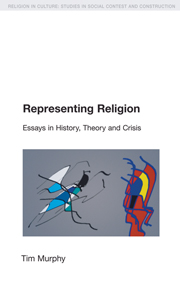Book contents
- Frontmatter
- Dedication
- Contents
- Acknowledgements
- Chapter 1 The “Crisis of Representation” and the Academic Study of Religion
- Part I Phenomenology, Consciousness, Essence: Critical Surveys of the History of the Study of Religion
- Part II Towards a Nietzschean Semiotics of Religion
- Notes
- Bibliography
- Index of Subjects
- Index of Names
Chapter 1 - The “Crisis of Representation” and the Academic Study of Religion
- Frontmatter
- Dedication
- Contents
- Acknowledgements
- Chapter 1 The “Crisis of Representation” and the Academic Study of Religion
- Part I Phenomenology, Consciousness, Essence: Critical Surveys of the History of the Study of Religion
- Part II Towards a Nietzschean Semiotics of Religion
- Notes
- Bibliography
- Index of Subjects
- Index of Names
Summary
Religion is solely the creation of the scholar's study. It is created for the scholar's analytic purposes by his imaginative acts of comparison and generalization. Religion has no independent existence apart from the academy. For this reason, the student of religion, and most particularly the historian of religion, must be relentlessly self-conscious. Indeed, this self-consciousness constitutes his primary expertise, his foremost object of study.
- Jonathan Z. Smith (1982, xi)For discourse to be possible at all, the basic categories have to be agreed on. Nothing else but institutions can define sameness. Similarity is an institution.
- Mary Douglas (1986, 55)What is religion? How can it be studied? Why is it the object of such diametrically opposed descriptions and evaluations? Textbooks and monographs on the subject usually begin with a definition of “Religion.” So, let us, for a moment, play the game “Definition” using “Religion” as our token.
What shall our first move be? Should we start the game with this move: “Religion is what the individual does with his own solitude” (Whitehead)? Or, perhaps this variant: “Religion is the feelings, acts and experiences of individual men in their solitude, so far as they apprehend themselves to stand in relation to whatever they may consider the divine” (James)? But then the counter-move is played: “the construction, apprehension, and utilization of symbolic forms are social events like any other; they are as public as marriage and as observable as agriculture” (Geertz).
- Type
- Chapter
- Information
- Representing ReligionEssays in History, Theory and Crisis, pp. 1 - 36Publisher: Acumen PublishingPrint publication year: 2007

